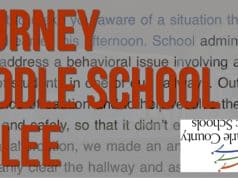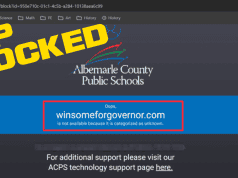By: Hank Martin
 The relationship between parents, their children, and the role of public schools in education has, for too long been an unnecessary subject of debate and discussion. At the heart of this debate is the long-held belief, factually supported throughout time, that parents are charged by God with the ultimate, sole, and sovereign responsibility for their children’s upbringing and education. Parents do indeed bear this divine charge, and public schools should respect and uphold their role while providing a complementary educational environment.
The relationship between parents, their children, and the role of public schools in education has, for too long been an unnecessary subject of debate and discussion. At the heart of this debate is the long-held belief, factually supported throughout time, that parents are charged by God with the ultimate, sole, and sovereign responsibility for their children’s upbringing and education. Parents do indeed bear this divine charge, and public schools should respect and uphold their role while providing a complementary educational environment.
Until recently, it was continually emphasized that the sacred and primary role of sovereignty and guardianship in raising and educating children, was wholly placed upon parents. Growing up, I could not even be administered an aspirin without prior consent from my parents—contrast this to the secretive black-ops tactics employed presently. The Bible, contains numerous passages that affirm parental authority and responsibility in the upbringing of children. Proverbs 22:6 states, “Train up a child in the way he should go; even when he is old, he will not depart from it.”
Parents were always, and by right ought to be, considered the first teachers of their children when it comes to imparting moral and ethical values. The values instilled in children by parents often form the foundation of their character and guide their decisions throughout life. In the Judeo-Christian realm, upon which this nation was inarguably founded, children are seen as a gift from God entrusted to parents for their care, nurture, and upbringing. This view underscores the idea that parents are stewards of this divine gift and, as such, bear the ultimate responsibility for their children’s well-being.
While parents have a divine charge and responsibility for their children’s upbringing, it does not preclude the role of public schools. Public education was designed to operate as a complement to parental authority, offering academic instruction and opportunities for socialization. Public schools have the potential to provide children with access to a broader range of educational opportunities and experiences than parents may be able to offer. This includes exposure to different subjects, extracurricular activities, and interactions with peers from diverse backgrounds.
Respecting the divine charge of parental sovereignty means respecting parents’ choices regarding their children’s education. Parents—by the very nature of our educational system’s original design—have the right to choose the educational path that aligns with their values, beliefs, and goals for their children. Public schools should foster collaboration with parents rather than impose educational values and philosophies. This collaborative approach ensures that parents remain actively involved in their children’s education. By recognizing shared values and goals between parents and educators, public schools can create an environment that respects parental sovereignty while providing a comprehensive education that meets the needs of all children.
Balancing parental rights with children’s rights and societal responsibilities is a complex task. Public schools have as of late, failed! Both by design and in implementation of policy, in ensuring that this balance is maintained, particularly when a school’s actions may infringe on a child’s well-being or educational opportunities, parents carry a sacred burden of a divine charge and responsibility for the upbringing and education of their children. This charge is grounded in theological foundations, moral and ethical values, and the belief that children are a gift entrusted to parents by God (or as some choose to phrase it, a higher power).
By their very nature of their design, purpose and funding, public schools must respect and uphold parental sovereignty while providing a complementary educational environment that expands children’s horizons simultaneously respecting parental values and choices. Respecting parental sovereignty does not mean public schools must supersede their role; rather, it calls for collaboration, shared values, and a recognition of the rights and responsibilities of both parents and educators in this way, the divine charge of parental sovereignty can be upheld while ensuring a comprehensive education for all children. Otherwise, the system fails, the parents lose a child and the child is forever changed.
The most recent tragic example is the recent series of events in Virginia comes not from Loudoun County this time, but from Appomattox.
https://nypost.com/2023/09/04/virginia-school-kept-teen-gender-transition-secret-suit/
In recent years, discussions surrounding gender identity and expression have gained significant attention in schools and in society as a whole. One controversial issue that has emerged is whether schools should keep parents uninformed when it comes to gender identification of their children. Some argue that students should have the autonomy to explore and express their gender identity without parental involvement, (remember that aspirin I mentioned earlier?), the rationale is often to protect students who may face hostility or rejection at home. However, this approach raises ethical and practical concerns. Excluding parents from discussions related to their children’s gender identity raises questions about parental rights. Parents have a legal and moral responsibility for their children’s well-being and education. To exclude them from decisions that may profoundly affect their child’s life is ethically problematic.
Transparency and trust are essential components of a healthy parent-school relationship. Schools have a duty to communicate openly with parents about matters concerning their child’s education, safety, and well-being. Excluding parents from discussions about gender identity undermines this trust. Children’s understanding of gender identity evolves as they grow. What they believe or express at one age may change later. Schools must recognize the evolving nature of identity and the role parents play in helping their children navigate complex issues.
Discussions surrounding gender identity and expression have gained significant attention in schools and society as a whole, and the Appomattox debacle is a prime example of this, one of many. The once controversial issue as to whether or not schools should keep parents out of the loop when it comes to gender identification of their children is no longer academic, it’s a discussion from reality presently. The recent Appomattox County School scenario serves as a prime example of the potential pitfalls of such a policy. Some argue that students should have the autonomy to explore and express their gender identity without parental involvement. The rationale is often to protect students who may face hostility or rejection at home. However, this approach not only raises ethical and practical concerns, it is a demonstrative failure
Excluding parents from discussions related to their children’s gender identity raises questions about parental rights which was established above. Parents have a legal and moral responsibility for their children’s well-being and education. To exclude them from decisions that may profoundly affect their child’s life is ethically problematic. Transparency and trust are essential components of a healthy parent-school relationship. Schools have a duty to communicate openly with parents about matters concerning their child’s education, safety, and well-being. Excluding parents from discussions about gender identity undermines this trust, and as transpired in the Appomattox situation. Again, it’s worth repeating, a child’s understanding of gender identity evolves as they grow. Schools must recognize the evolving nature of identity and the role parents play in helping their children navigate complex issues. Parents serve as a vital source of support and resources for their children. Excluding them from discussions related to gender identity deprives students of valuable emotional, educational, and healthcare resources that parents can provide, and it leads to life-changing and life-damaging consequences that sadly the parents and child must deal with for the rest of their lives.
The recent controversy in Appomattox County School, Virginia, highlights the potential consequences of excluding parents from gender identity discussions. In this case, the school district adopted a policy that allowed students to choose their preferred name and gender pronouns without parental consent or notification, and ultimately, a student was raped and trafficked for sex! No amount of money awarded can undo the damage needlessly and fecklessly created by the schools’ attempt at cover-up, nor can it undo this trauma to both student and parents.
Which brings me to this salient point; if you are unable or unwilling to get your children out of the local public schools, and if you truly care and love your children, you are left with only one yet obvious option: GET INVOLVED! Local school boards play a vital role in shaping the education system and ensuring that the needs and aspirations of the community are met. While these boards often consist of dedicated individuals, there is a pressing need for PARENTS to ACTIVELY engage in the educational decision-making process by becoming candidates for their local school boards, AND TO ACTIVELY support those who have. The involvement of parents on local school boards is not just beneficial but absolutely necessary for the development, maintenance and improvement of the education system. Parents bring firsthand knowledge of the challenges students’ face, a commitment to fostering equitable resources, and a dedication to transparent and accountable decision-making.
By becoming candidates on their local school boards, parents can actively contribute to shaping the educational landscape, ensuring that it meets the needs and aspirations of all students and families. Their voices and perspectives are invaluable assets in the ongoing effort to provide a high-quality education for every child. Perhaps a curtailment of your entertainment time, your screen time; maybe worry less about coaching a team and more about being in school board meetings and networking with likeminded parents. This mindset recently was witnessed in Dearborn Michigan, when Christians, Muslims, and atheists united in protest to the sexually perverse agenda that that schoolboard was pushing.
It is well past time for parents to fully awaken to the idea that our current local public school systems present a clear and present danger to their children. It is past time to acknowledge that incidents like the one in Loudon County and now in Appomattox should not happen — ever — much less be allowed to continue. The current state of our schools — sexual assaults, rapes in the locker room, brawls, unserved school bus routes, and other unknown tawdry and despicable acts taking place in the new unisex restrooms — is nothing new. I experienced this crawl towards darkness as a student, then the slow march became a double-time parade during the two decades I was forced to be a public school parent. Alas, here we are, running at a marathon’s pace towards a bleak destination. I endeavored to sound the alarm, but parents were unable to acknowledge the truth. But now, that truth is undeniable and unignorably inescapable.
Schools use the universal aegis of “Student Privacy” as a cloak to isolate parents and falsely convince them that they are alone in having concerns or issues. They gaslight parents to believe that there must be something wrong with their child and their family. Parents need to connect, create their own information exchange and support system. There needs to be a group, call it, oh I don’t know, PURITE. Parents United for Responsibility Integrity and Truth in Education. Within this group, there can be established anonymity for parents to share their experiences with one another, and also the rhetoric they are hearing back.
Going forward, it’s obvious that parents claiming to love and care for their own children, parents who understand their sovereignty over their own children and how they must account for it on the threshold of eternity, MUST change their action strategy. Act now; it’s only you who can!









Defund Public Schools. Let parents use their tax dollars to send their children to the school that they choose. The government has proven that they cannot educate our children.
Well thought out and skillfully written! Albemarle County seems to be intent on becoming a Fairfax or a Louden of central Virginia! Sadly, the recent redistricting has resulted in Albemarle County destined to be without any conservative representation in the legislature.
Does Haas even know that every pillar of caste cited by Wilkerson in her book on a U.S. “caste” system: 1) is no longer official policy of the states 2) was eliminated as policy (where possible) to the objections of Democrats, and 3) was instituted by Democrats? Perhaps that book taught Haas that Democrats are the problem? BTW, Oprah–the elite one who gifted 300 audience members with “free” cars, for which they had to then pay around $5,000 each in taxes–loved the book, as did Obama (you know, he of the Political “caste”). Perhaps not.